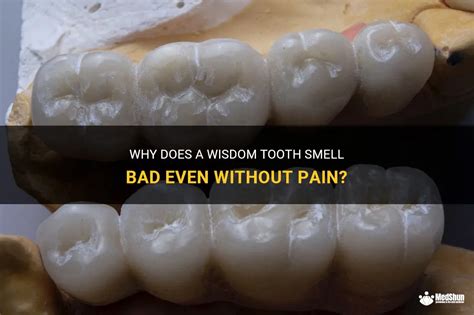Bad Smell From Wisdom Tooth

The dreaded bad smell from a wisdom tooth - a common complaint among many individuals who have undergone wisdom tooth eruption or are experiencing wisdom tooth issues. This unpleasant odor can be embarrassing, uncomfortable, and even affect a person’s self-confidence. But what causes this bad smell, and how can it be addressed?
Firstly, it’s essential to understand the anatomy of a wisdom tooth and how it can lead to bad breath. Wisdom teeth, also known as third molars, are the last set of teeth to emerge in the human mouth, typically between the ages of 17 and 25. These teeth are located in the back of the mouth, and their position can make them difficult to clean, leading to the accumulation of bacteria, food particles, and other debris. When bacteria break down this debris, they release volatile sulfur compounds (VSCs), which are responsible for the characteristic bad smell associated with wisdom tooth issues.
There are several reasons why a wisdom tooth might be causing a bad smell. One common reason is impaction, where the tooth does not have enough room to erupt properly, leading to the formation of a pocket or cyst around the tooth. This pocket can trap bacteria, food particles, and other debris, creating an ideal environment for the growth of microorganisms that produce VSCs. Another reason is poor oral hygiene, where the area around the wisdom tooth is not cleaned properly, allowing bacteria to accumulate and cause bad breath.
Other possible causes of bad smell from a wisdom tooth include:
- Pericoronitis: An infection of the gum tissue surrounding the wisdom tooth, which can cause pain, swelling, and bad breath.
- Dental caries: Tooth decay or cavities in the wisdom tooth, which can trap bacteria and food particles, leading to bad breath.
- Gum disease: Inflammation of the gum tissue surrounding the wisdom tooth, which can cause bad breath, bleeding, and other symptoms.
To address the bad smell from a wisdom tooth, it’s essential to practice good oral hygiene, including regular brushing, flossing, and rinsing with an antibacterial mouthwash. Additionally, visiting a dentist for a professional cleaning and examination can help identify any underlying issues, such as impaction, pericoronitis, or dental caries, and provide guidance on the best course of treatment.
In some cases, surgical removal of the wisdom tooth may be necessary to eliminate the bad smell and prevent further complications. This is typically recommended when the wisdom tooth is impacted, decayed, or causing other oral health issues.
To minimize the risk of bad smell from a wisdom tooth, it’s crucial to:
- Practice good oral hygiene: Brush and floss regularly, paying special attention to the area around the wisdom tooth.
- Visit a dentist regularly: Regular check-ups can help identify any issues early on, preventing more severe problems from developing.
- Avoid tobacco and smoking: Tobacco and smoking can exacerbate oral health issues, including bad breath.
- Eat a balanced diet: A healthy diet rich in fruits, vegetables, and whole grains can help maintain good oral health and reduce the risk of bad breath.
In conclusion, a bad smell from a wisdom tooth can be an embarrassing and uncomfortable issue, but it’s often a sign of an underlying problem that can be addressed with proper oral hygiene, regular dental check-ups, and professional treatment. By understanding the causes of bad smell from a wisdom tooth and taking steps to prevent it, individuals can maintain good oral health, boost their confidence, and enjoy a fresher, cleaner smile.
What are the common causes of bad smell from a wisdom tooth?
+The common causes of bad smell from a wisdom tooth include impaction, poor oral hygiene, pericoronitis, dental caries, and gum disease.
How can I prevent bad smell from a wisdom tooth?
+To prevent bad smell from a wisdom tooth, practice good oral hygiene, visit a dentist regularly, avoid tobacco and smoking, and eat a balanced diet.
When is surgical removal of a wisdom tooth necessary?
+Surgical removal of a wisdom tooth may be necessary when the tooth is impacted, decayed, or causing other oral health issues, such as pericoronitis or gum disease.
In the following sections, we will explore the topic of bad smell from a wisdom tooth in more detail, including the symptoms, diagnosis, and treatment options available.
Symptoms of Bad Smell from a Wisdom Tooth

The symptoms of bad smell from a wisdom tooth can vary depending on the underlying cause, but common signs include:
- Bad breath: A persistent, unpleasant odor that can be embarrassing and affect a person’s self-confidence.
- Pain or discomfort: Pain or discomfort in the jaw, gums, or teeth, which can be mild or severe.
- Swelling or inflammation: Swelling or inflammation of the gum tissue surrounding the wisdom tooth.
- Bleeding or discharge: Bleeding or discharge from the gum tissue surrounding the wisdom tooth.
These symptoms can be uncomfortable and affect a person’s quality of life, making it essential to seek professional help from a dentist or oral surgeon.
Diagnosis of Bad Smell from a Wisdom Tooth

Diagnosing the cause of bad smell from a wisdom tooth typically involves a combination of:
- Visual examination: A visual examination of the wisdom tooth and surrounding gum tissue to look for signs of impaction, pericoronitis, or other issues.
- X-rays or imaging tests: X-rays or imaging tests, such as CT scans or MRI scans, to evaluate the position and condition of the wisdom tooth.
- Gum pocket measurement: Measuring the depth of the gum pockets surrounding the wisdom tooth to assess the level of gum disease or pericoronitis.
Based on the diagnosis, a treatment plan can be developed to address the underlying cause of the bad smell and prevent further complications.
Treatment Options for Bad Smell from a Wisdom Tooth
The treatment options for bad smell from a wisdom tooth depend on the underlying cause, but common treatments include:
- Antibiotics: Antibiotics to treat pericoronitis or other infections.
- Pain management: Pain management medications, such as analgesics or anti-inflammatory medications, to alleviate discomfort or pain.
- Oral surgery: Oral surgery to remove the wisdom tooth, which may be necessary if the tooth is impacted, decayed, or causing other oral health issues.
- Professional cleaning: Professional cleaning of the wisdom tooth and surrounding gum tissue to remove plaque, bacteria, and other debris.
In conclusion, a bad smell from a wisdom tooth can be an embarrassing and uncomfortable issue, but it’s often a sign of an underlying problem that can be addressed with proper oral hygiene, regular dental check-ups, and professional treatment. By understanding the causes of bad smell from a wisdom tooth and seeking help from a dentist or oral surgeon, individuals can maintain good oral health, boost their confidence, and enjoy a fresher, cleaner smile.
